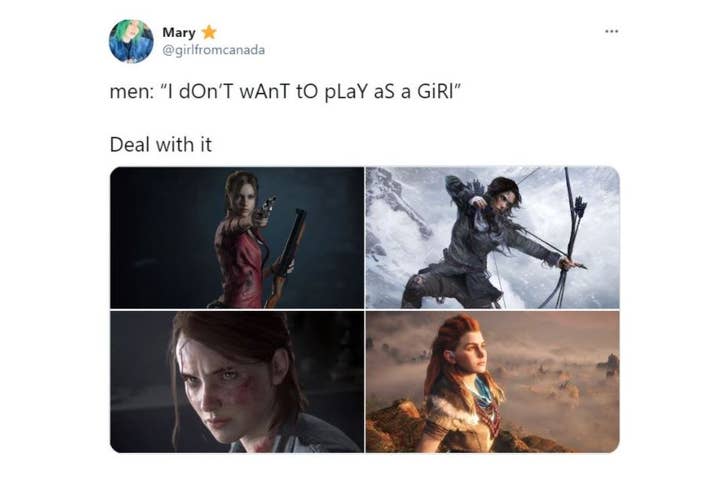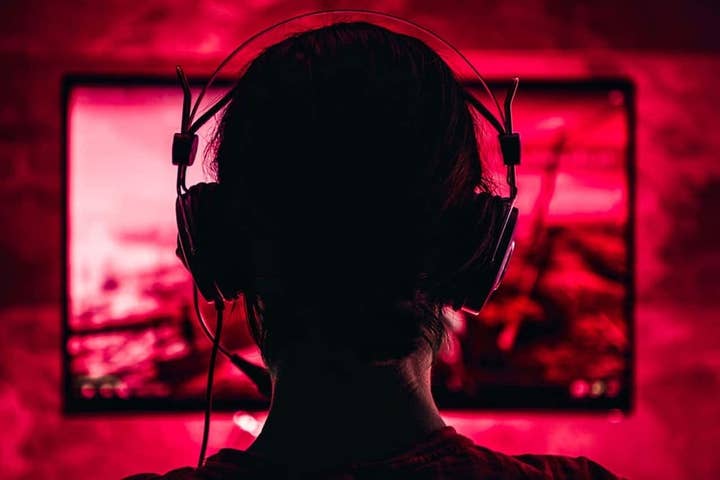What a woman games journalist experiences in a week
The scale of abuse that women journalists receive for doing their jobs is a major issue -- we need accountability and real consequences
It's time we talk about a very serious issue happening within the games industry, both at the professional and fan level: the way women journalists are treated with toxic behaviour, and the simple steps we can take to ensure this kind of harassment stops.
Many women journalists experience some form of harassment when reporting on the games industry. It has been said that women receive an extreme amount of harassment when compared to their male counterparts, as it is not only based on their work but also their gender. Unfortunately, this has become 'the norm' for women journalists. This has been considered acceptable for a while now, and we are told to "just ignore it." However, the problem must be discussed and action needs to be taken.
The United Nations Educational, Scientific, and Cultural Organization (UNESCO) conducted a global survey of over 900 women journalists last year, and the results are frightening: 73% of women journalists who responded had experienced online violence in the course of their work. That is close to three out of four women who will experience that treatment just for doing their job. Their work is journalism; simply creating or producing a report on current events based around facts and opinions for broadcast or publication. These issues have yet to be addressed.
When I tailor my content to highlight issues of female representation in the games industry, I receive more hate
Professionally speaking, I have been a journalist for over ten years, and while I have done a wide range of work for a variety of outlets, my focus has always been on highlighting issues and experiences in the games industry through a female lens. Over the course of those ten years I have heard from women firsthand how I have helped them be more vocal and realize that they are not alone. I have also been lucky to meet some wonderful industry folks and attend events. My journey has made me become an advocate for women in the games space. This includes sharing my own personal story of abuse at the hands of someone from Ubisoft last year.
On the other hand, over that same ten year period I received countless death threats, harassment and hurtful comments. At times it was an occasional trolling comment; other times it was dozens of comments ranging from sexism to outright toxicity and hatred. It appears that when I tailor my content to highlight issues of female representation in the games industry, I receive more hate. But the issue is not whether I can effectively advocate for women; the issue is that I and many other female journalists are receiving these types of messages based on our gender or the very topic of advocacy.
What happened early this year
In December last year, I wrote a piece on the toxic culture around women in the games industry. While I did receive some backlash, it was nothing compared to what happened this January.
I posted a tweet commenting on the notion that men do not like to play as female characters. While this is a generalized statement on my social media page, it was meant to be a quick-witted observation on the industry at the time. I paired it with a comment -- "deal with it" -- and images of strong female lead characters: Ellie from The Last of Us, Claire Redfield from Resident Evil, Aloy from Horizon: Zero Dawn, and Lara Croft from Tomb Raider. Little did I know that this tweet would cause such debate and result in multiple attacks on myself, my character, and my work.

Eventually, the tweet ended up being reposted from an account that has a reputation for controversial views, with the caption "games journalisming." Almost instantly, my mentions were filled with hate towards my writing, my beliefs and even my looks, but that was not the end of it. The same account also hosts a Youtube channel with over one million subscribers, and it published a video about my tweet, claiming that I was attacking men, that I was a horrible journalist, and taking my stance just to gain a profit.
This was simply a tweet, not tied to any of my work, and therefore there was no profit to be had -- ironic given that the account used the tweet to feed its subscribers new content, which in turn is a way to gain profit via Youtube revenue.
As my mentions on social media became filled with people questioning my career, sending me hate, and claiming that I should disappear, I struggled with what to do. Twitter seems to be a huge driving force in allowing this type of behaviour to occur. It has been said that "women are abused on Twitter every 30 seconds," offering further proof that toxic behaviour against women continues to happen at a rapid rate, especially women who may be at the forefront of journalism.
Many women journalists become the focus of hate campaigns for simply reporting on or voicing their opinion about a controversial topic, regardless of the context of said topic or opinion. Twitter continues to claim that abuse violates its stated rules, and this includes tweets that promote violence and/or threats against people. However, when I reported numerous tweets at me, nothing was done. Below are some samples of the messages I have received:

The fine line
When it comes to speech online, it can be a fine line between what is problematic and what is not. Unfortunately, when messages that are hateful and promote violence are reported, even if the offending individual is banned from the platform the message was on, it does not stop the user from creating a new account. There are little to no consequences for those who commit this type of offence. Online harassment is the type of crime that can be difficult to track, and therefore it is often overlooked. Trolling inhabits a grey zone between freedom of speech and anonymous attacks.
Many women journalists, including myself, have to deal with the consequences on our own. Sometimes that means deactivating social media accounts, which hurts the promotion of our work and the development of our personal brands. These threats can quickly lead to journalists having to change their phone numbers due to numerous calls, or having to change addresses due to doxxing.
Threats can quickly lead to journalists having to change their phone numbers, or having to change addresses due to doxxing
These are very real factors that women journalists have to deal with over the course of their careers, and this can take a toll on mental health. Having to constantly worry about comments under an article, where people post about your appearance, comments of a sexual nature, threats, and the uncertainty of what someone behind the computer could possibly do -- it leaves women journalists questioning their entire careers and worth as people.
I have focused my career on highlighting this type of toxic behaviour towards women in the industry, so it was expected that not everyone would agree with me and I would receive hate. I am an advocate for a reason, and I am realistic about that coming with opposing opinions. However, there is a difference between someone expressing their opinion on an article and attacking a journalist based on their gender.
The very nature of participating in a discussion is to hear other viewpoints and opinions and learn from the parties involved. That's how expressing an opinion can to an actual discussion. At times, this is not the treatment or respect women journalists have the luxury of experiencing. More often than not, a woman will receive hate on every article or tweet, just because she has become a target.
I write all of this in hope of creating the opportunity to have a respectful discussion about the treatment of women in the games industry.
What's the solution?
Please take a moment to think about the facts -- with 73% of women journalists receiving online harassment, this needs to be at the forefront of discussion more often. While some may not agree with what a journalist has to say, we are humans trying to do our jobs. The world is a frustrating place and it's easy to shoot the messenger, but before tearing someone down, insulting their appearance, or threatening them with terrifying violence simply because they dared to type words on a page, think about the fact this is a real person you are alienating. An article of this nature will no longer need to be written if we take a moment to talk about our opinions without responding with direct attacks. Is wanting to be treated fairly too much to ask?
Women have been more vocal in sharing, but the sole pressure of change cannot be placed on women only
But there needs to be accountability and real consequences when this type of behaviour happens. While we cannot expect everything to change at once, social platforms enforcing stricter rules will in time change the ability to harass in the first place. This will encourage women to be more open about their experiences and create a safer space for everyone. When a woman journalist is threatened online, it needs to be taken seriously.
Social media and streaming sites need to do a better job when it comes to security measures. Response rates need to be quicker when an attack is reported, and the banning of a user's IP should become a consequence when the threat is severe. Women journalists need to continue to raise awareness of these issues and talk about them publicly -- it's why I continue to do so -- but this can only happen if they feel safe. In order to mitigate their emotions, women journalists can set boundaries or rules by blocking certain words, turning notifications off, or attempting to ignore comments. This can help to alleviate the mental stress that women endure when receiving such harassment.
Things are changing. Women have been taking a stand and trying to bring about a positive force for good -- such as the widespread abuse allegations that started in 2019, which sparked discussion over what women have to endure while working in the games industry. We saw a resurgence of this last year, as more women openly shared experiences they had experienced at companies such as Ubisoft -- myself included.
Women have been more vocal in sharing, but the sole pressure of change cannot be placed on women only -- it needs to be done across the board.
Journalism can be a stressful job for anyone, but women take on an added layer of strain. There is a constant and overwhelming fear of getting bombarded with hate-filled comments attacking not only your work, but your appearance and your character. It can be extremely discouraging when the offenders so rarely face any consequences, which results in so many women suffering in silence, or giving up careers they were passionate about because someone was exceptionally insulting, slanderous, or "just joking."
We all need to work together to be better. We need to acknowledge toxic and destructive behavior, and instead of attacking others when they ask for help, trying to repair the broken parts of the industry so many of us love, and want to work in.
With over ten years experience, Mary Gushie allows her personality and passion for the industry shine through in her journalism. She is a huge advocate for women in gaming -- @girlfromcanada.
